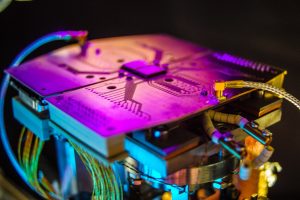
Universal Quantum has today emerged out of stealth announcing an oversubscribed £3.6 million — or $4.5 million — seed-funding round, according to a post on the company’s Medium site. The company is set to develop its ground-breaking new quantum computing approach and compete with the world’s biggest quantum computing companies with backing from highly influential tech investors.
The UK Government’s Science Minister, Amanda Solloway MP, will announce the investment at a quantum technology industry event.
Universal Quantum’s prestigious list of investors includes Hoxton Ventures, who were early backers of Deliveroo, Village Global, backed by the likes of Bill Gates, Mark Zuckerberg and Jeff Bezos, Propagator VC, Luminous VC, 7Percent, as well as influential individuals. Investors have described Universal Quantum as having ‘the best approach to deliver on the exponential promises of quantum’.
The University of Sussex spin-out company, founded by quantum computing experts Professor Winfried Hensinger and Dr Sebastian Weidt in 2018, is intent on building the world’s first large-scale quantum computer with Hensinger as the Chief Scientist & Chairman and Weidt as the Chief Executive Officer.

“We’ve done the research, now this investment puts us on an incredibly exciting path to actually building practical quantum computers.”
“We are absolutely thrilled to have such high-calibre investors join our vision and being excited about our technology and outstanding team,” said Weidt. “We’ve done the research, now this investment puts us on an incredibly exciting path to actually building practical quantum computers.”
Hensinger and Weidt have developed a radical new approach to building a quantum computer. While some companies have created small quantum machines, Universal Quantum believes that only its technology has a realistic opportunity of being scaled up into machines large enough to unleash the huge potential of quantum computing.
“Quantum computing has the power to change the world for the better,” said Hensinger. “We are taking a small but significant step toward realizing that potential by getting started with the engineering to create practical quantum computers. While it is a major engineering challenge, our technology and approach do not rely on making major physics breakthroughs.”
Key to Universal Quantum’s appeal are some fundamental differences in its approach to building a large-scale quantum computer compared to the rest of the field. Competing approaches may require billions of laser beams for calculations, operate at extremely cold temperatures marginally above absolute zero (-273C), which can prohibit scaling up to many quantum bits (qubits), and complex engineering to connect individual quantum computing modules through optical fibre links.
Universal Quantum, however, has developed technology based on trapped ions (charged atoms) to carry out calculations using well-established microwave technology, such as that used in mobile phones, removing the need for a prohibitive number of laser beams. It substantially reduces the necessary cooling requirements, allowing to operate at a much easier to obtain temperature of (-200C) which is critical in making quantum computers far more practical and capable of operating millions of qubits. It has also developed a unique modular approach based on fast electric-field links connecting individual modules, enabling the company to scale-up to practical quantum computers that are able to process millions of qubits.
The team’s combined experience and unique take on quantum technology was attractive to the funders, according to several members of the venture capital firms investing in Universal Quantum.
“When we looked for a quantum computing team to invest in it was very clear that Winfried and Seb not only had the experience to deliver on such a technical challenge but have the vision to do so,” said Andrew J. Scott, a founding partner at 7percent ventures. “This will be a step change for science, equivalent in impact to the invention of the microprocessor or the internet. It’s just the sort of big idea at 7percent Ventures we love to back.”
Lomax Ward from Luminous VC echoed Scott’s statement.
“Quantum computing will unlock seismic changes for both this generation and the next,” said Ward. “We are delighted to be partnering with two visionary scientists and founders in Prof Winfried Hensinger and Dr Sebastian Weidt in their mission to crack quantum computing at scale. Luminous Ventures exists for investments like this.”
Providing capital to this tech firm should also have ramifications for the university and its host community, according to Professor Adam Tickell, Vice Chancellor of the University of Sussex.
“This University of Sussex spin-out company will see the Greater Brighton area become a new centre of gravity in the world’s rapidly growing quantum computing industry,” said Tickell. “We are very proud of the achievements of Professor Winfried Hensinger and Dr Sebastian Weidt, and their team, who have long been pushing the boundaries of developments in this area, from publishing the world’s first blue-print for building a large-scale quantum computer in 2017 to pioneering technology which uses microwaves rather than lasers to execute calculations within the quantum computer.”
The next twelve months will see a much larger funding round (Series A), which will drive even more significant progress, according to the post.
The seed-funding — to the value of £3.6 million — has been secured from the following investors:
· Hoxton Ventures — an early-stage technology venture capital firm. They partner with founders seeking to invent new market categories or transform large, existing industries. Their portfolio includes Deliveroo and Darktrace.
· Village Global — an early-stage venture capital firm backed by some of the world’s most successful entrepreneurs including Diane Greene, Bill Gates, Jeff Bezos, Reid Hoffman, Mark Zuckerberg and Sara Blakely.
· Propagator VC, which invests in companies with deep tech at its core taking their first steps towards building commercial success-stories. Their focus areas are: machine learning/AI; Quantum Computing; Robotics; Encryption; and Materials
· Luminous VC, which backs founders with a vision to significantly change the world with breakthrough technologies and applied science.
· 7percent, who invest in early stage tech start-ups which represent billion-dollar opportunities.
· FoundersX Ventures is a Silicon Valley venture capital firm investing in disruptive technologies in smart enterprises with AI and big data, quantum computing, space technology, digital healthcare, Fintech and Foodtech.
· La Roca Capital. German Seed investor specializing in insurance tech and other promising product development.














